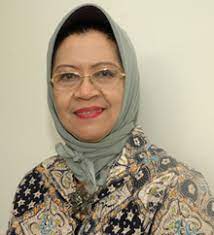Sofia Mubarika Haryana
Alamat surat elektronik: sofia.mubarika@ugm.ac.id
Akun SINTA (Science and Technology Index) Kemdikbud
Sofia Mubarika Haryana menjadi staf di bagian Histologi dan Biologi sel , setelah lulus Pendidikan Dokter di FK UGM, tahun 1974. Tahun 1981 mendapatkan Brevet Histologi sebagai Ahli Histologi. Pada tahun 1985, Sofia mendapatkan gelar Master for Medical Science (M.Med.Sc) dari Auckland University of Medical School New Zealand dalam bidang Immunobiology. Pada tahun 1987 mengikuti Summer Course Biology of Parasitism di Woods Hole, Massachusetts USA , memperdalam tentang Immunology dan Molecular Biology selama 8 minggu. PhD dalam bidang Cancer Molecular Genetics diperoleh dari Kobe University Medical School Japan pada tahun 1994. Penelitian hubungan Epstein Barr Virus dan kanker Nasopharyngs diawali pada tahun 1997 bersama sekelompok tim dari beberapa bagian di FK UGM dan RS Dr. Sardjito dengan mengikutsertakan beberapa orang mahasiswa S2 Bioteknologi dan S3 FK UGM (URGE Batch 2). Dilanjutkan dengan kolaborasi dengan VUmc dan AvL didanai dari KWF dalam membangun kapasitas SDM berbagai bagian klinik di FK UGM dan RSUP Dr. sardjito. Tahun 2003 mendapatkan dana dari Masyarakat Eropa (EU) untuk kanker nasopharyngs berkolaborasi dengan beberapa Insitusi LN seperti Belanda (AvL, VUmc), Perancis (IGR) dan Karolinska Institute. Meluluskan tidak hanya PhD dari UGM , Tetapi juga dari UI, dan Belanda (UI, AvL). Telah meluluskan banyak mahasiswa S2 Biomedik, Bioteknologi dan Doktor dari berbagai Insitusi di Indonesia. Sejak tahun 2011 Sofia lebih memfokuskan penelitian biomarker kanker berbasis mikroRNA sampai sekarang. Menghasilkan 3 paten dan sejumlah publikasi international bereputasi. Selain itu Sofia juga aktif dalam mengembangkan penelitian translational kanker sampai sekarang. Sofia juga menjadi anggota Komisi Ilmu Kesehatan Akademi Ilmu Pengetahuan Indonesia sampai saat ini. Menjadi Tim Reviewer Penelitian Litbangkes dan DIPI sampai saat ini. Dalam masa pendemic Covid, ikut berpartisipasi dalam pengembangan rapid test berbasis antibody RI-GHA, menghasilkan 1 paten yang dimanfaatkan untuk membantu dalam serosurveillance, juga pada pasca vaksinasi.
Sofia Mubarika Haryana became a staff member in the Department of Histology and Cell Biology after graduating from Medical Education at the FK UGM in 1974. In 1981, she received a Histology Brevet as a Histologist. 1985 Sofia received her Master of Medical Science (M.Med.Sc) from Auckland University of Medical School New Zealand in Immunobiology. In 1987, he attended the Biology of Parasitism Summer Course in Woods Hole, Massachusetts, USA, where she explored Immunology and Molecular Biology for 8 weeks. PhD in Cancer Molecular Genetics was obtained from Kobe University Medical School Japan in 1994. Research on the relationship between Epstein Barr Virus and Nasopharyngeal cancer was initiated in 1997 with a group of teams from several departments at FK UGM and Dr. Sardjito Hospital by involving several Master of Biotechnology and Doctor of Medicine UGM students (URGE Batch 2). This was followed by a collaboration with VUmc and AvL, funded by KWF, to build human resources capacity in various clinics at FK UGM and Dr. Sardjito Hospital. In 2003, she received funding from the European Community (EU) for nasopharyngeal cancer in collaboration with several foreign institutions such as the Netherlands (AvL, VUmc), France (IGR), and the Karolinska Institute. She graduated her students not only PhD from UGM but also from UI and the Netherlands (UI, AvL). She has graduated many Masters Degree students in Biomedicine, Biotechnology, and Doctorate from various institutions in Indonesia. Since 2011, Sofia has focused more on research on microRNA-based cancer biomarkers until now. Produced 3 patents and several reputable international publications. Besides that, Sofia has also been active in developing translational cancer research. Sofia has also been a member of the Indonesian Academy of Sciences Health Sciences Commission. She has been on the Research Reviewer Team for Litbangkes and DIPI until now. During the Covid pandemic, I participated in developing the RI-GHA antibody-based rapid test, resulting in one patent used to assist in serosurveillance and post-vaccination.

